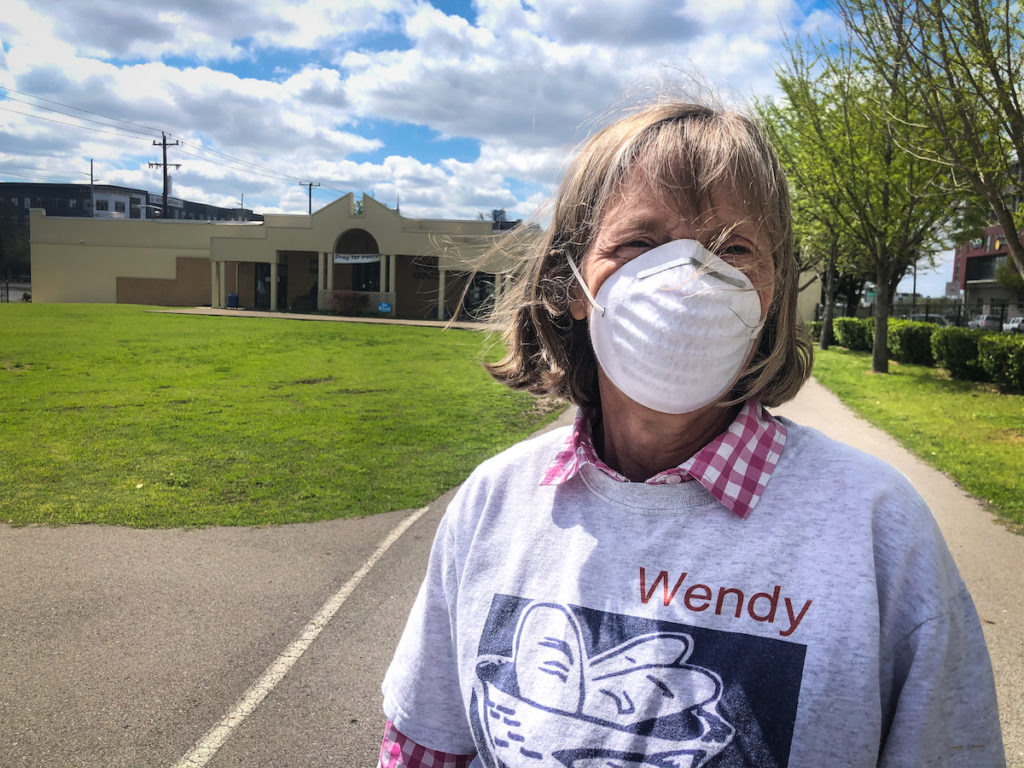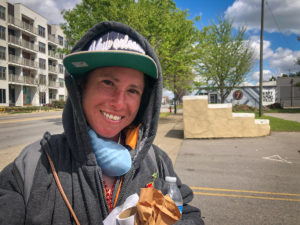
Typically in Nashville, nearly a dozen group meals are available every day for people who are homeless. But COVID-19 has changed everything.
During social distancing, major shelters remain open, but many of the standalone meals have closed. Those that remain have scaled down to a skeleton crew of volunteers. Information about where to eat is scattered. And hunger has suddenly become a primary issue for people living on the streets.
One place homeless Nashvillians can still find a hot meal three times a week is at Catholic Charities’ Loaves and Fishes program in East Nashville. Due to new restrictions, the meals are no longer sit-down, community style. These days, a single, masked volunteer hands plates out the door to women and men like Sideways, who knows it may be awhile before there’s another chance to get hot food.
“We don’t eat everyday,” Sideways says. “Sometimes (every) two or three.”
The solo server is Wendy Overlock, who’s been serving meals here for 15 years. Even though all of her volunteers have been temporarily laid off, she’s staying on — cooking, serving, and cleaning up after as many as 70 guests per meal.
“We just served lunch to a smaller crowd today, about 40 something today,” she says. “We’re still trying to do hot meals as opposed to sack lunches, because I think they get a lot of those.”
A Downed Network
Nashville’s wide network of meals has been a huge benefit, says Lisa Cook, founder of Sacred Sparks Ministry, which builds relationships with people living on the streets and helps them do laundry.
“When I first started doing this type of ministry,” she says, “I was told by people who were in the homeless community that if anyone who is homeless in Nashville is hungry, they’re just lazy. You could find a place where you could go and get at least one meal, probably two or three every day. We have that sort of infrastructure set up in Nashville. We’ve been lucky with that.”
But with the upheaval from coronavirus, that reliable network has fractured. Laurie Green, founding director of the Southern Alliance for People and Animal Welfare, says that in more than 20 years of doing outreach she has not seen this level of food insecurity in campsites.
“They’re hungry, hungrier than they’ve ever been,” Green says. “I’ve gone into camps with food sacks where they’ve been several days without eating. When a pack of peanut butter crackers is grabbed up and eaten that quickly — it just makes me want to go somewhere and scream. It’s just really hard.”
And figuring out which meals are still active isn’t the only problem. There’s also the issue of getting there.
 Tasha Lemley WPLN News
Tasha Lemley WPLN NewsPictured here on her birthday, April has been homeless for 5 years and says she’s had a hard time finding a meal every day during the COVID-19 pandemic.
Typically, people travel for meals, which are often served in the urban core. Larry, one man who frequents these meals, says they’re now traveling even further to find services — on foot or using public transportation. He mentions a large campsite in West Nashville and says he hears “all of them [are] coming this way because they can’t survive over on that side.”
That means that for the more than 500 people living in campsites, many who are medically vulnerable, finding food comes with new risks. Linda Bailey, co-director of Open Table Nashville, says her outreach workers are encouraging people in campsites to stay put.
“The more you move around, the more risk you’re at. If you’re having to leave to get your meal, you’re having to be in a lot of lines with a lot of people.” Bailey says. “The safer food plan is distributing directly to campsites.”
Coordinating Efforts
Groups like The Salvation Army are trying to do just that. They’ve been regularly delivering meals to some of the largest campsites since the tornado in early March.
But there are 150 or more encampments spread out across Davidson County and beyond, so distributing meals on that scale demands a lot of coordination. Meanwhile, homeless outreach in Nashville has traditionally operated in silos, with multiple organizations working independently to serve as many people as they can.
Judy Tackett, director of Metro’s Homeless Impact Division, says that’s starting to change.
While “outreach has not been as coordinated traditionally,” Metro is building a coordination plan, she says. “The organizations are stepping up. I see that all the time.”
Tackett’s department is currently in the middle stages of a massive food box distribution plan in collaboration with Open Table Nashville, The Salvation Army, Second Harvest and other outreach agencies.
But information has to actually reach the people who need it — and that’s tricky. They’ve set up a website as an attempt to communicate, but even people who own phones in the homeless community are struggling to find places to charge them right now, so they’re still largely depending on word of mouth to find out where food is.
Coronavirus and the issues it brings are an extra stressor for an already stressful situation. But it’s also one that, hopefully, is impermanent, says one man named Steve.
“This will go away,” he says. “This too shall pass.”
Resources
Keep an eye on homelessnashville.com under “Provider Updates.” All services subject to change.
- Room In The Inn is still serving lunch curbside Monday through Friday. A mandatory free ticket is available beginning at 6 a.m.
- Community Care Fellowship (Ken & Carol’s) is open 9 a.m. to 2 p.m. Monday through Friday for to-go breakfast and lunches, laundry, showers and hygiene item distribution.
- Loaves and Fishes has to-go hot lunch available Tuesdays, Wednesdays and Saturdays.
- People Loving Nashville is continuing their Monday 6 p.m. meal at War Memorial Plaza, located at the corner of 7th and Union in downtown Nashville — just outside of War Memorial Auditorium.
- Bridge Ministry is giving a hot meal Tuesday evenings from 5:30 to 6:30 p.m. near the Jefferson Street bridge.
- Green Street Church has grab-and-go meals available Wednesday evenings from 6 to 7:15 p.m.
- Downtown Presbyterian Church is handing out breakfast bags Saturday mornings at 8:30 a.m.

